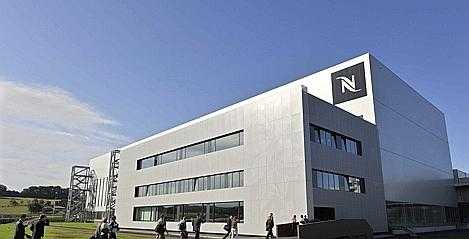In the continuation of Nespresso efforts to reduce the environmental impact of its production centres, the brand’slatest production centre in Romont, has become the first factory in Switzerland to achieve the renowned LEED certification which recognises industrial buildings for their environmental design and efficiency.
LEED® (Leadership in Energy and Environmental Design)– a voluntary certification programme developed by the US-based NGO, Green Building Council (USGBC) – is one of the most rigorous and renowned certifications recognising exceptional environmental quality of buildings.
It not only evaluates the energy- and water-efficiency of a building, it also weighs aspects such as employees’ health and wellbeing at the workplace, and infrastructure for environmentally low-impact mobility.
There are four levels of certification: certified, silver, gold or platinum.
18% reduction of energy use
The new Nespresso site in Romont – the third production centre to be built in Switzerland to support growing consumer demand for Nespresso coffee – managed to obtain Gold certification thanks to a number of measures being implemented.
The plant is located right next to an existing railway connection, enabling the supply of raw materials and the distribution of the majority of finished products to be transported by train.
The heat generated by the roasters and air compressors throughout the facility is fully recovered and used to heat the production centre. And as more industrial equipment is added to the site, any surplus heat will be supplied to the local heating network in the city of Romont.
This, combined with the use of LED lighting throughout the building led to an 18% reduction of energy use on site. In addition, 1,330m2 of solar photovoltaic panels were installed on the roof.
Integrating sustainability in the design, construction and operations
“We are proud to obtain the LEED® Gold certification for the Romont production centre. It is a huge achievement for Nespresso. We worked hard to integrate sustainability in the design, construction and operations of the production centre and reduce its environmental impact, ” said Laurent Bovet, Romont construction project manager.
During the facility’s construction phase, 75% of building waste was recycled and 20% of the building materials used were recycled materials. Nespresso also devised a plan to effectively manage rainwater, protect the local vegetation and limit dust while the building works were going on.
Efficiency measures
Romont was also built to achieve a 45% reduction in overall water consumption, compared to traditional facilities. This has been achieved by using rainwater collected on the roof to service the toilets, and by using low-consumption sanitary systems. It has also cut potable water consumption by 50% through the use of more efficient equipment.
A number of measures have also been taken to encourage employees to adopt more sustainable modes of transport, including a dedicated cycle lane, 75 sheltered parking spaces for bikes and parking spaces for low-emission vehicles.
“By carrying out rigorous monthly monitoring of our energy consumption, we will be able to put in place even more measures to reduce our impacts further,” added Sébastien Foucart, Romont production centre manager.
Romont is the 19th Nestlé factory globally to have achieved the LEED® certification. Nespresso has invested more than 300 million Swiss francs on the construction and development of the new facility at Romont, bringing its total investment in production infrastructure in Switzerland to over 1 billion Swiss francs over the last 12 years.

















